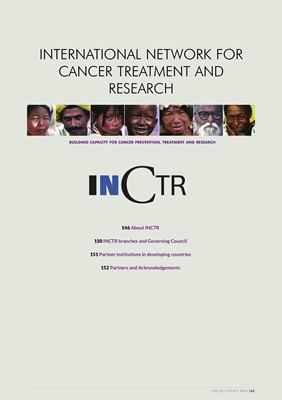
T
he International Network for Cancer Treatment and
Research (INCTR) is an international nongovernmental
organization (NGO) that was
established to address a neglected global health problem -
the ever increasing burden of cancer in developing countries.
The founder members of INCTR included the former Institut
Pasteur in Brussels and the International Union Against
Cancer, now known as the Union for International Cancer
Control (UICC). The National Cancer Institute in the United
States provided financial and technical support and the
organization began its activities in 2000. INCTR's
headquarters are located in Brussels and it has branches
throughout the world. INCTR became an NGO in Official
Relations with the World Health Organization (WHO) in
January 2010.
The need for INCTR: Cancer in developing countries
Approximately 85% of the world's people live in low- and
middle-income countries. In 2012, Globocan estimated that
there were approximately 14.1 million new cases of cancer
and 8.2 million deaths from cancer in the world, with 65% of
deaths occurring in low- and middle-income countries. The
number of cancer cases continues to rise across the world,
but much faster in these countries because development
brings decreased mortality and an increased, albeit declining,
birth rate, as their populations live longer. These
demographic changes are accompanied by the adoption of
unhealthy lifestyles from high-income countries, particularly
smoking and increasingly, overeating and a sedentary
lifestyle.
Resources of all kinds for treating cancer are limited in lowand middle-income countries, such that patients who develop
cancer frequently lack access to a facility capable of making
an accurate diagnosis and providing appropriate therapy.
There is a lack of drugs, a paucity of radiation therapy
facilities and very few cancer specialists or other health care
workers who are needed to effectively care for cancer
patients (see Figure 1). Diagnosis may be so delayed that
there is little that can be done even if the patient does finally
reach a facility competent to care for them. Terminal care is
not widely available, and regulations and attitudes are still
largely directed towards preventing the misuse of opioids
rather than relieving the pain of dying patients, such that
most patients die without symptomatic relief or little, or no,
mental or spiritual comfort. It is estimated, for example, that
less than 1% of patients who need palliative care in India
receive it.
INCTR is unique in that it focuses only on the developing
world. INCTR is dedicated exclusively to helping to build
sustainable capacity in low- and middle-income countries in
order to assist these countries in cancer prevention, early
detection, diagnosis, treatment and palliative care: See Box 1.
Who INCTR works with
INCTR utilizes health care professionals familiar with the
problems of developing countries to enable it to achieve its
goals. See Box 2.
INCTR develops local capacity within these countries by
training health care professionals to establish "centres of
excellence" in the delivery of feasible, affordable and
effective care, including palliative care, that are considered
"best practice" so that they, in turn, can train others within
their country or region.
INCTR works through its branches in implementing various
programmes and projects conducted in collaboration with
partner institutions in developing countries.
INCTR integrates research into its programmes in order
that outcomes can be documented and evaluated. This, in
turn, enables health care professionals working in lessresourced countries to become active
contributors to the
knowledge of cancer management throughout the world.
INCTR's structure
INCTR has consultants and volunteers dedicated to the
accomplishment of its goals. Although its headquarters are
located in Brussels, it has branches in the United States,
INTERNATIONAL NETWORK FOR CANCER TREATMENT AND RESEARCH
‰ To reduce the incidence of cancer in resource-limited
countries through public and professional education about
the causes of cancer and how to use this information in
cancer prevention
‰ To detect cancer early through public and professional
education about the early signs of cancer and what to do if
they appear
‰ To diagnose cancer accurately through pathology training
and, where important and feasible, imaging techniques
Box 1: INCTR's goals - Making a difference
146 CANCER CONTROL 2014
ABOUT INCTR